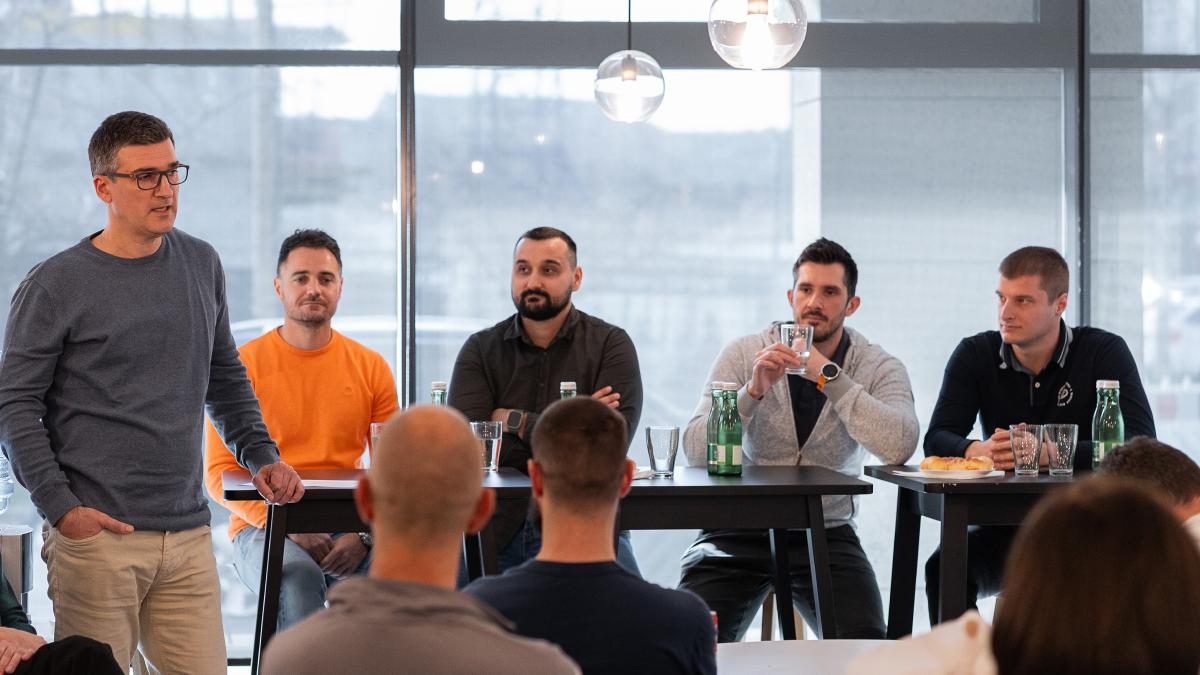This May, HTEC had the pleasure of promoting 150 of our team members to higher positions. Our growth has been marked by the emergence of countless opportunities for dedicated, fast-thinking, brave, and industrious team members to take on greater responsibility and advance their careers.
It’s important to note that the 150 promotions were not a one-off campaign, but a culmination of our regular review process for all employees. Furthermore, promotions will continue to take place outside of the review process, as our expansion continues to generate opportunities year-round.
However, the promotions were an important milestone for HTEC that puts our growth into perspective and shows what it means for our team members. To provide a more detailed illustration of the impact of HTEC’s trajectory, we chose to highlight some of our team members who have seen their career paths accelerate in HTEC. Our first interviewee is Dino Rac, freshly promoted to the role of Engineering and Delivery Lead.
When did you start working at HTEC and what was your initial role?
I started working in HTEC’s Belgrade office in October 2019 as a Java QA Automation Engineer with mid-level seniority. My first project in the company was working with a startup. It was a small team where I was the only automation engineer with one more manual QA engineer on board as well. At the time, there were no other automation engineers with Java-specific knowledge in the Belgrade office. I had support and mentorship from several senior QA Automation Engineers, but Java tech was not their specialty.
On that project, I was tasked with creating my first automation framework on my own. It took a lot of time, but I succeeded. My supervisor was impressed with the result and the work that I put into it, and that was a sort of a starting point for my growth in the company.
Was it a terrifying experience, creating your first automation framework from scratch?
No, because my supervisors were very clear about what I was supposed to do. They placed clear expectations before me, which helped me approach the work with sharp and complete focus. Also, that was a big part of why I decided to join HTEC, the opportunity to start something of my own from scratch.
What was the next step in your development?
Once the MVP stage of the aforementioned project was finished, I was assigned to a new one. For this project, I was entrusted with building upon that initial automation framework to make it more suitable for an enterprise solution, as the client’s business basically exploded. Initially, there were five people on the HTEC team for the project, and the number quickly grew to 70. This number included about 10 QAs who I had to educate to get up to speed with automation. While this was not formalized yet, we did manage to create a mechanism to share the knowledge and empower the QAs to work independently, as we had three or four teams working on different aspects of the project.
How did you start mentoring?
There was a need to increase our overall knowledge, and I guess I was visible for that role. At the time, I had no experience as a team leader, but I had plenty of support, both from my superiors and from colleagues from the Project Management Office. They helped me and other people create a structure for how we should work.
By this point, my role changed to senior. At the time, we still didn’t have the position of Tech Lead at HTEC. Parallel to my project work, I was also given a chance to support a different and very large project as a sort of an informal Tech Lead. Essentially, I was tasked with helping the QAs on this project to set the processes and create the framework and everything that was needed for that scale.
In 2021, I moved to this project in full capacity as an informal Tech Lead. At the same time, I was also included in different activities of HTEC’s Tech Excellence Office, most notably defining the technical part of the competency framework for QAs.
What was the next step towards becoming an Engineering & Delivery Lead?
In the second half of 2021, I spoke with my project supervisors about my future steps. We realized that the project required not just technical guidance for QAs, but we also needed someone who would be their direct manager. I was offered that role, and I accepted.
At some point, I started assuming additional responsibilities, after our Engineering Lead left the project. I took a greater role in communicating with the clients and managing their expectations, so it was somehow natural to step up from the pure Delivery Lead role to Engineering Lead. But I still wear two hats. I still act as a tech lead for QAs, trying to empower them (especially the QAs on my project) to become the new tech leads.

Was it difficult for you to transition from a purely technical role into mentoring and management?
Actually, my first job was as a professor of economics. Yeah, I wasn’t always an IT guy, but I was able to switch paths with the support of a bunch of friends, some of whom are my colleagues in HTEC. But with that teaching experience, it was natural for me to educate people. I also leaned on my own experience as a QA, identifying all of the pain points in my own learning process and trying to create templates and shortcuts to overcoming them. When I started out as a QA, there weren’t many available learning materials. In a strange way, this was actually beneficial for me as a mentor, because everything that I would gather I tried to structure, and those are the materials and experiences that I share with my mentees to speed up their learning process.
From the management perspective, my college studies were in management, so I had theoretical knowledge. Of course, when you are faced with real-life challenges, you see that literature cannot fully prepare you for every scenario. Thankfully, I had full support from my superiors and other colleagues, some of whom worked very intensively with me to help me find my sweet spot and my managerial style.
What do you see as the most important factors for your professional growth in HTEC?
One part of it is personal—I was never shy about embracing challenges. The other part is to have an environment that recognizes and encourages it.
Another thing that’s important is that we are always surrounded by people who want to help. It doesn’t matter if my challenges are technical, managerial, or people-related, I always have someone to ask with the full confidence that they will be straight and honest with me.
“Networking is really easy in HTEC if you want to get involved. I realized over time that this is one of the biggest perks of working at HTEC, the fact that I wasn’t alone at any moment. It is a lot easier to develop yourself when you have a team behind you that’s willing to help.”
In your experience, what distinguishes HTEC from other IT companies?
I have worked in two large software engineering companies prior to joining HTEC. If I were to compare them, I’d say that HTEC is very good at recognizing the people that want to advance and providing those opportunities. Perhaps just as importantly, the company also understands and respects the desires of the team members who are not as eager to advance so fast and provides different lateral career opportunities and options for professional growth in different directions.






